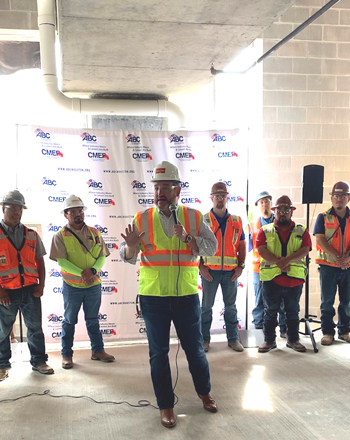 Senator Ted Cruz visited Spawglass’ Village of Southhampton jobsite in Houston this week to tour the site, hear from construction executives, and promote his new bill, the Education Freedom Scholarships and Opportunity Act during an event hosted by Associated Builders and Contractors of Houston.
Senator Ted Cruz visited Spawglass’ Village of Southhampton jobsite in Houston this week to tour the site, hear from construction executives, and promote his new bill, the Education Freedom Scholarships and Opportunity Act during an event hosted by Associated Builders and Contractors of Houston.
In an effort to help people attain the skills they need to contribute to an American economy being negatively impacted by skilled workforce shortages, Cruz’ bill would allow individuals and businesses to receive dollar for dollar federal tax credits for donations to non-profits that provide scholarships for primary, secondary, and post-secondary education, including training programs and apprenticeships. The bill would potentially allow individuals to receive yearly federal tax credits for donations up to 10% of their adjusted gross income and corporations to receive federal tax credits up to 5% of their taxable income, encouraging them to invest in the education and training of America’s future workforce. States would have the option to opt in or out and the authority to decide which students are eligible for the scholarship credit and what constitutes eligible educational expenses and eligible educational providers.
“My number one priority in the Senate is and always has been jobs…That’s the top priority of Texas… Texans want more jobs, higher wages, and more opportunity…If you want to see more jobs, you want lower taxes and less regulations that kill jobs. If you create an environment where people can invest capital in new projects with low taxes and limited regulations that’s how you create opportunity," said Cruz.
“Last month I introduced legislation focused on education because education is foundational to everything else we do… it provides $10 billion dollars a year…in federal tax credits for contributions to scholarship granting organizations…half of it is focused on workforce development and adults," Cruz continued. "It’s dollar for dollar credits for contributions to scholarship granting organizations that are encouraging apprenticeships and technical training. There are millions of adults in this country who are not working or don’t have good jobs. They don’t have the skills to come out here and work on a construction site. They don’t have the skills to be a carpenter or electrician or lay drywall, but if they got the skills, it would transform their lives…This is designed to give people tools to get that training so they can begin working on a career that can provide opportunities for the future."
 Cruz mentioned that a challenge in passing the bill will be bringing Democrats on board. Although it has the support of President Trump, Secretary of Education Betsy DeVos, and Senate Republicans, it will likely receive pushback from Democrats who have historically voted against school choice legislation. “Teachers unions have historically resisted programs that bring in competition…25 years ago the argument that was used against school choice was that it will destroy public schools, and if that was the case I would oppose it," he said. "I wouldn’t support something that would destroy public schools, they’re too foundational for educating our kids…When kids and parents have a choice, that competition drives up the quality of education."
Cruz mentioned that a challenge in passing the bill will be bringing Democrats on board. Although it has the support of President Trump, Secretary of Education Betsy DeVos, and Senate Republicans, it will likely receive pushback from Democrats who have historically voted against school choice legislation. “Teachers unions have historically resisted programs that bring in competition…25 years ago the argument that was used against school choice was that it will destroy public schools, and if that was the case I would oppose it," he said. "I wouldn’t support something that would destroy public schools, they’re too foundational for educating our kids…When kids and parents have a choice, that competition drives up the quality of education."
Construction leaders in attendance expressed concern about a lack of skilled workers that is negatively impacting the industry and slowing overall economic growth. “It’s been an ongoing situation for the last three or four years. We have an extreme shortage of qualified personnel in every field of our work, drivers, equipment operators, laborers, and mechanics. It impacts our schedules and the rate that we can complete our jobs for our clients,” said Sam Craig, President of Craig and Heidt, inc.
To alleviate workforce shortages, Craig said accelerating the education and the training of the construction workforce to expand the possibilities for students and show them that there are good careers in the construction field would help. He thinks Cruz’ bill will help, especially because it encourages private investment in workforce training and avoids the red tape and inefficiencies associated with bureaucracy.
The above article was authored by Charles Frantes and originally published on TexasGOPVote.com.

